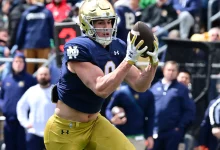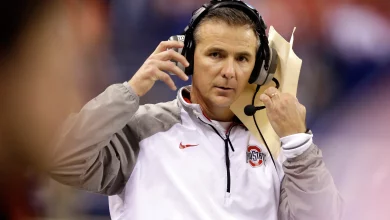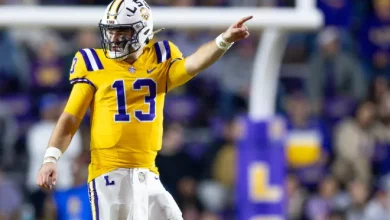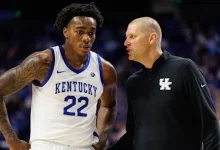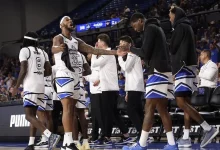Detroit Lions and Chicago Bears lose star center Frank Ragnow to retirement, a blow that indirectly benefits their rival.
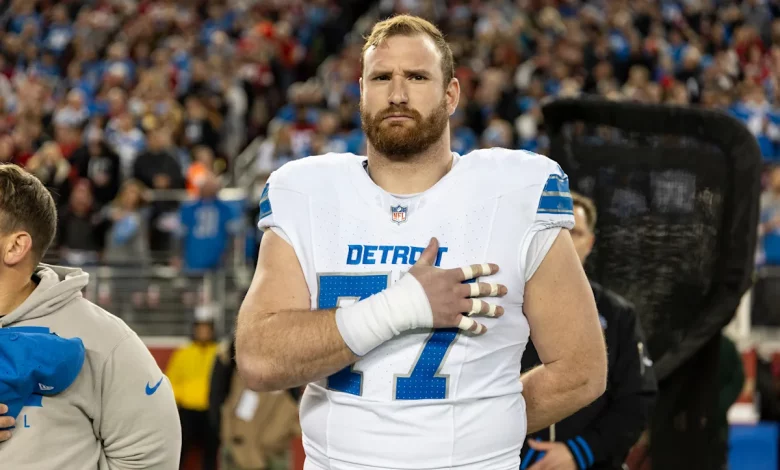
In a surprising turn of events that has sent ripples through the NFL, Detroit Lions star center Frank Ragnow announced his retirement from professional football. The news shocked fans, teammates, and analysts alike, as Ragnow had been a cornerstone of the Lions’ offensive line and a key player in their recent rebuild efforts. While his retirement is undoubtedly a significant loss for the Lions, it also holds unexpected implications for their longtime division rival, the Chicago Bears.
This article explores the impact of Frank Ragnow’s retirement on both the Detroit Lions and Chicago Bears, analyzing how this development alters the competitive landscape of the NFC North and what it means for both franchises moving forward.
The Career and Legacy of Frank Ragnow
Frank Ragnow’s journey in the NFL began when he was drafted by the Detroit Lions in the first round of the 2018 NFL Draft. Since then, he has established himself as one of the premier centers in the league. Known for his physicality, intelligence, and leadership on the field, Ragnow was a lynchpin in the Lions’ offensive line, protecting quarterbacks and creating running lanes with precision.
Ragnow’s accolades include multiple Pro Bowl selections and All-Pro honors, underscoring his status as an elite interior lineman. Beyond his on-field contributions, Ragnow was a respected leader in the locker room and a positive influence in the community.
The Surprise Retirement Announcement
Ragnow’s retirement announcement came unexpectedly during the offseason, catching many by surprise. While details about his decision have been limited, sources suggest that injuries and the physical toll of playing on the offensive line played a role.
For the Lions, losing a player of Ragnow’s caliber creates an immediate challenge. The center position is crucial to offensive line cohesion, and finding a replacement who can match his skill and leadership is no easy task. The Lions’ front office now faces a pressing need to address this gap through free agency, trades, or the upcoming draft.
Impact on the Detroit Lions
The Lions, who have been gradually building a competitive roster under head coach Dan Campbell and general manager Brad Holmes, must now recalibrate their plans. Ragnow’s presence was instrumental in both pass protection and run blocking schemes, and his leadership helped anchor a young and developing offensive line.
Without Ragnow, the Lions will need to:
1. Identify a Replacement: The priority will be to find a center who can step in and provide stability. Whether through the draft or free agency, this will be a focal point for the Lions’ offseason strategy.
2. Adjust Offensive Schemes: The coaching staff may need to adapt their offensive approach to account for changes in the offensive line’s dynamics, potentially emphasizing quicker passes or different blocking schemes.
3. Maintain Locker Room Leadership: Ragnow’s retirement leaves a leadership void that must be filled by other veterans or emerging players to maintain team cohesion.
Despite the setback, the Lions have young talent and promising prospects who could step up. The team’s resilience and adaptability will be tested as they aim to continue their upward trajectory in the NFC North.
How the Chicago Bears Benefit Indirectly
While Frank Ragnow’s retirement is a blow to the Lions, it indirectly benefits their division rival, the Chicago Bears. The NFC North is known for its fierce competition, where small margins often decide playoff berths and division titles.
The Bears, who have struggled in recent seasons to find consistency on offense, could gain a competitive edge with the Lions losing such a pivotal player. Here’s how Ragnow’s retirement benefits Chicago:
1. Weakened Lions Offensive Line: Without Ragnow anchoring the line, the Lions’ offense may face increased pressure and reduced effectiveness. This could lead to more turnovers, sacks, and stalled drives in games against the Bears.
2. Psychological Boost: Rivalries are as much mental as physical. Knowing a key opponent has lost a star player can boost the Bears’ confidence heading into division matchups.
3. Strategic Advantage: The Bears’ coaching staff can tailor their defensive game plans to exploit potential weaknesses in the Lions’ offensive line without Ragnow’s presence.
4. Playoff Implications: In a tightly contested division, any dip in the Lions’ performance opens opportunities for the Bears to improve their standings and possibly secure playoff spots.
The Broader NFC North Implications
Ragnow’s retirement shakes up the NFC North dynamics beyond just the Lions and Bears. The Green Bay Packers and Minnesota Vikings, both perennial contenders, will also factor in this development as they prepare for the upcoming season.
With the Lions potentially weakened, the division could see a more open race, giving each team a better chance to capitalize. The Packers, led by Aaron Rodgers, and the Vikings, with their strong defense, will be closely watching how the Lions adjust.
Fans and Media Reactions
The news of Ragnow’s retirement sparked a wave of reactions from fans and analysts. Lions supporters expressed disappointment but also understanding and respect for Ragnow’s decision. Many took to social media to share highlights and memories of his impactful plays and leadership moments.
Bears fans, on the other hand, welcomed the news as a silver lining for their team’s divisional battles. Analysts debated how this would shift the balance of power in the NFC North and speculated on potential roster moves the Lions might make.
What’s Next for Frank Ragnow?
While stepping away from football, Ragnow’s future remains bright off the field. Known for his character and leadership, many expect him to stay involved in football through coaching, mentoring, or broadcasting. His experience and insights would be valuable assets to any team or organization.
Ragnow has also been active in community service and charity work, which may become a larger focus as he transitions to life after playing.
Frank Ragnow’s retirement marks the end of an era for the Detroit Lions and creates new opportunities and challenges for the NFC North. While the Lions must address a critical gap on their offensive line, their division rival, the Chicago Bears, stands to benefit indirectly from this development.
As the NFL offseason progresses, all eyes will be on how the Lions respond and whether the Bears can capitalize on this shift. The NFC North’s competitive landscape has been altered, and the upcoming season promises intriguing matchups and battles for supremacy.
Ultimately, Frank Ragnow’s legacy as a Lions legend remains intact, and his retirement reminds us of the physical demands of professional football and the ever-changing nature of the sport.


